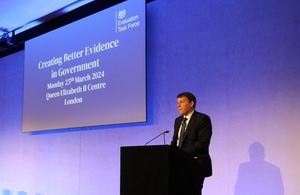The final phase of the government’s £15 million Evaluation Accelerator Fund (EAF) has been announced as part of the commitment to making the UK a global leader in evidence-based policy-making.
In his keynote address at the Evaluation Task Force (ETF) annual conference, the Minister for the Cabinet Office, the Rt. Hon. John Glen MP, revealed the recipients of the final phase of funding from the ETF’s Accelerator Fund.
These projects receiving funding in this latest round will help boost the government’s understanding of delivering effective policy interventions in youth crime, net zero, and civil service recruitment.
Since 2021, the ETF has sought to tackle critical evidence gaps across government to ensure that decisions about which projects to stop, modify or expand are informed by good quality evidence.
The Accelerator Fund was open to teams from across the public to pitch innovative solutions for evaluating the impact of new policies or new ways of delivering public services.
Minister for the Cabinet Office, John Glen said:
Ensuring data-driven evidence sits at the heart of all government decisions is critical to delivering lasting and measurable change for the country.
This funding will help to channel the innovative potential of our public sector and allow them to take the lead to improve the delivery of public services and drive value for taxpayer money.
Through the rigorous evaluation of these government programmes, we can help to create blueprints for success which all departments can learn from.
One successful bid from the College of Policing will evaluate the impact of Operation Divan. The evaluation will measure the long term impact of the scheme, which intervenes with young people who have previously carried or been suspected of carrying a knife or other weapon. The scheme allocates specialist officers to young people to provide advice and communicate the risks of carrying a weapon and refer them to support services if necessary.
Another funded programme is the Department for Energy Security and Net Zero’s proposal to use evaluation data to improve the projects and appraisals of net-zero policies. In the Cabinet Office, c.£200k will be awarded to a project to evaluate the Civil Service Fast Stream’s impact to better inform decisions about its operation.
The money was awarded by the Evaluation Task Force, a joint Cabinet Office and HM Treasury unit set up as part of a commitment in the Declaration on Government Reform to embed gold-standard evaluation in government.
To date, the ETF has worked on 382 programmes with a value of £202bn, supported 18 departments in developing and publishing evaluation strategies that outline each department’s approach to evaluating programmes and building robust evidence, and ensured evaluation is integral to each department’s policy-making process.

















